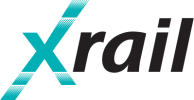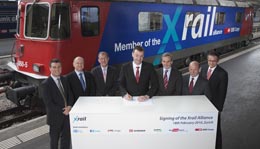Our history
In 2007, UIC (International Union of Railways) officially launches the ”Xrail” project to significantly improve the European Wagonload offer.
- Six railways initially participate: DB Schenker Rail, Fret SNCF, Green Cargo, Rail Cargo Austria, SBB Cargo and SNCB Logistics
- In 2008, CFL cargo and CD Cargo join the project, whereas Fret SNCF decides to leave the initiative by the end of 2009
- In 2010, the Alliance is formally founded and the Xrail legal entity is created with headquarters in Brussels, Belgium
- 2010 also sees the launch of the first Xrail IT tools, which enable the Alliance partners to create international transport plans as well as to automatically receive transport status messages and track & trace information
- In November 2010, SBB Cargo and Xrail receive the Swiss Logistics Award for their innovative solution to enable seamless European Wagonload transports
- In the course of 2011 to 2012, Xrail further enhances its IT solutions and the members roll out the Xrail standards to further relations, reaching a coverage of about 15% of common Wagonload volumes being powered by the Xrail features
- The members pledge themselves in 2013 to an industry change by committing to implement capacity booking systems and to connect those via Xrail to overcome the current production models’ restrictions to offer seamless and reliable Wagonload transports all-across the partners’ networks
- In the course of 2013 to 2014, Xrail successfully manages the process between the partners to derive the future standards and specifications for the Xrail Capacity Booking (XCB) initiative and develops the central broker system
- In the course of 2015, first Xrail partners will connect their newly developed systems to the XCB broker and initial tests and pilots for capacity-booked transports will be performed








